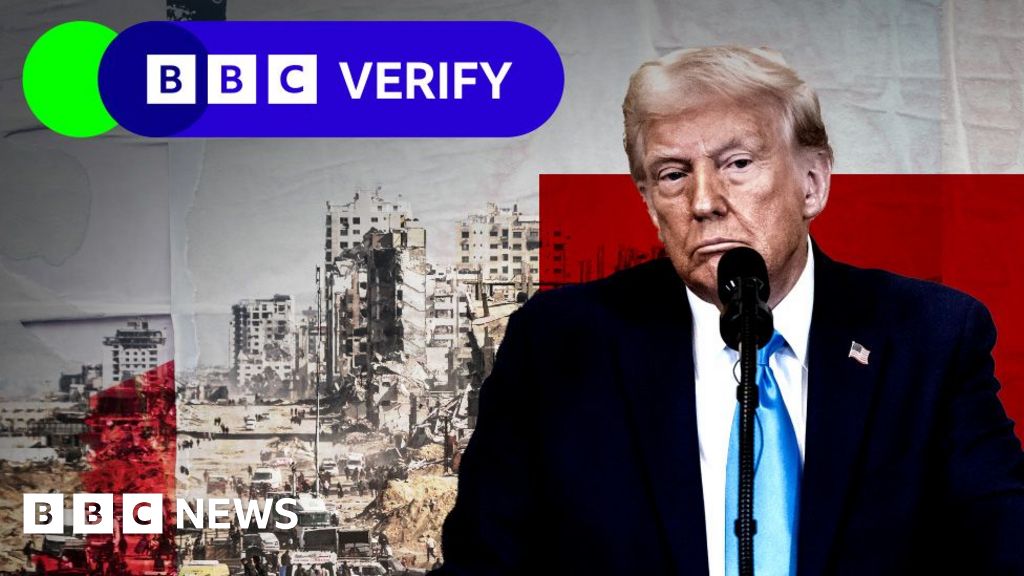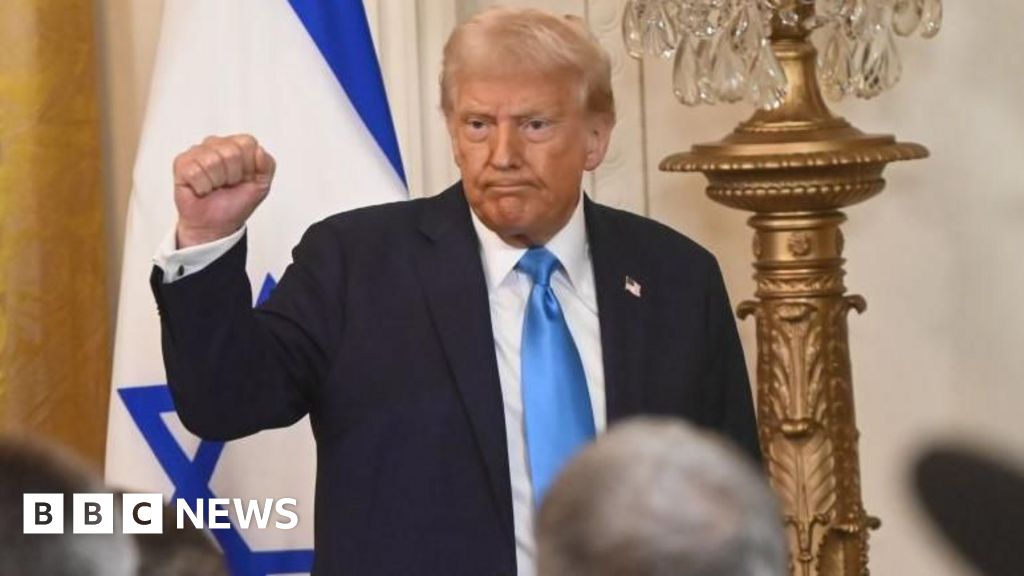Yolande Knell
Middle East correspondent
Reporting fromJerusalem
Rushdi Abualouf
Gaza correspondent
Reporting fromCairo

 BBC
BBC
Mahmoud Bahjat, who is living in a tent camp in central Gaza, says he and other Palestinians refuse to be resettled elsewhere
For most Palestinians living in the Gaza Strip there is already a painful history of forced displacement that is at the heart of their response to US President Donald Trump's plan to take over the war-torn territory.
Speaking to the BBC, residents of a tent camp in the central town of Deir al-Balah expressed shock and defiance at the idea of being permanently resettled outside.
"Even if it costs us our souls, we will not leave Gaza," said Mahmoud Bahjat, who is from the north. "We are against Trump's decision. He ended the war but displacing us would end our lives."
On the other hand, many Israelis have been expressing satisfaction at the radical ideas from the White House, particularly those on the far-right who seek to resettle Gaza.

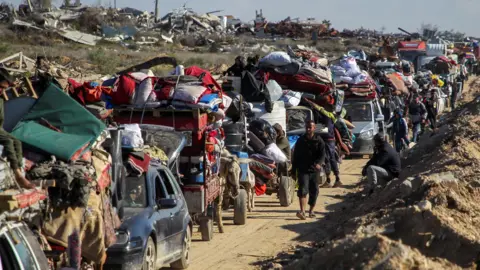 Reuters
Reuters
Thousands of displaced Gazans are making their way back to what's left of their homes in the north
Since a ceasefire took hold in Gaza - on the eve of Trump's inauguration last month - there have been dramatic scenes of Palestinians returning to what is left of their homes.
Families have piled up possessions into cars and donkey carts or walked long distances along the coastal road, often just to reach piles of rubble.
According to the UN, at least 1.9m people, or about 90% of the population, across Gaza became displaced during 15 months of war.
The scenes of Palestinians on the move have echoed black-and-white footage from 1948 and the mass evacuations that took place during fighting before and after the creation of the state of Israel.
More than 700,000 people were then forced from their homes. The majority of Gazans are descendants of those original refugees.

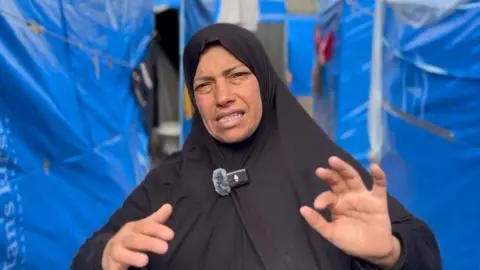
Jamalat Wadi says Gazans "want to remove the rubble and live on the land"
Standing between rows of plastic sheeting in the Deir al-Balah camp, Jamalat Wadi says that her family has now sacrificed enough and that they are determined to build a new home.
"We endured a year and half of war. When [the Israeli military] finally withdraw from here, we want to remove the rubble and live on the land."
"After the US made Israel destroy our houses in Gaza, he is telling us that Gaza is destroyed and we have to leave?" Ms Wadi goes on. "If there is only one drop of blood left in our children, we won't go out of Gaza. We won't give up on it!"
Many Palestinians we spoke to called on Jordan and Egypt - which Trump is pressing to take displaced Gazans - and for Saudi Arabia - which he wants to normalise relations with Israel - to hold out against US pressure.
- Latest updates: Trump's Gaza takeover plan widely criticised
- Why does Trump want to take over Gaza and could he do it?
- Trump's Gaza plan will be seen as flying in face of international law
Since its establishment, Israel has rejected the right of Palestinian refugees to return to their historic homeland, as this would have left the Jewish people as a minority within its borders. Today, there are about 5.9m Palestinians registered by the UN, with most living in Gaza, the occupied West Bank, Jordan, Syria and Lebanon.
Israel has long argued that those who were dispossessed should be absorbed by Arab countries, pointing out that thousands of Jews left these to come to Israel during the regional turmoil after it became a state.
Israeli officials suggest that by proposing to take over war-torn Gaza, creating a "Riviera of the Middle East" after resettling Palestinians elsewhere, the Trump administration is offering fresh thinking on a long-running conflict.

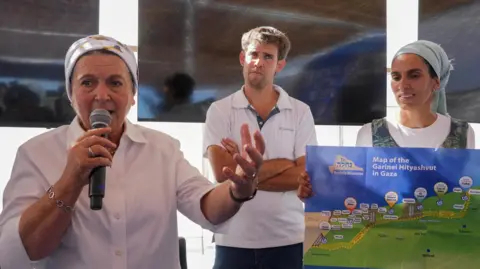 Reuters
Reuters
Settler group Nachala is calling for settlements in Gaza that Israel evacuated two decades ago to be re-established (file photo)
While Trump notably did not back the re-establishment of settlements in Gaza, settler leaders have reacted enthusiastically to the idea of displacement, calling on the Israeli government to act immediately.
Israel occupied Gaza and the West Bank in the 1967 Middle East war and began constructing settlements in both that are widely seen as illegal under international law. In 2005, Israel withdrew its troops and settlers from Gaza, although the UN still regards it as Israeli-occupied territory.
"Assuming Trump's declarations about transferring Gazans to other countries throughout the world actualise, we need to move quickly and build settlements throughout the Gaza Strip," stated the Nachala settlement organisation, which claims it has hundreds of activists ready to move there.
"No part of Israel should be left unsettled by Jews. If we leave any area desolate it is liable to be overtaken by our enemies," Nachala added.
In contrast, the Israeli anti-occupation NGO, Peace Now, dismissed the Trump plan. It backs the creation of an independent Palestinian state alongside Israel as part of the long-standing international formula for peace in the region, known as the two-state solution.
Peace Now said there was "no feasible way to transfer two million Gazans" outside.
"It's time to stop fantasising about ethnic cleansing and forced displacement in Gaza and face reality - there is only one solution that can guarantee security and stability in the Middle East: two states for two peoples and an end to the Israeli-Palestinian conflict," it commented.

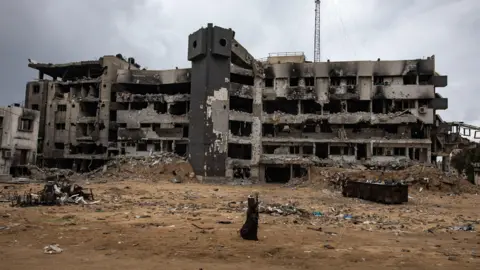 EPA
EPA
The UN estimates that almost 70% of the buildings in Gaza have been damaged or destroyed
Many Israelis and Palestinians are concerned about what the latest announcements could mean for the current talks on extending the Gaza ceasefire.
The next stage of the deal is meant to see the return of some 60 remaining Israeli hostages - not all of whom are alive - and a more permanent end to the fighting.
However, the brother of one Israeli hostage held by Hamas told us: "I don't take what Trump says too seriously. It's not realistic. He's shooting for the stars."
He added that this was "like with Canada" - referring to the US leader's suggestions that it should become his country's "51st state".
Some Gazans did acknowledge that they felt one aspect of President Trump's declaration was based on reality - his comments that the small coastal strip has become "unliveable".
Last month, a UN damage assessment showed that clearing over 50m tonnes of rubble left in Gaza as a result of the heavy Israeli bombardment could take 21 years and cost up to $1.2bn.
Bilal al-Rantisi, a former customs worker, is in shock after arriving back in Gaza City with his wife and four children having spent more than a year displaced in the south.
"We have returned to a catastrophe, the worst in history," he said despondently. "I found neither my home nor my siblings' homes were standing. Trump doesn't speak in vain. He knows that Gaza is no longer a place fit for human habitation."
He said he was hoping to sell his car and his wife's gold jewellery to raise funds.
"I will leave Gaza at the earliest possible opportunity. Yes, all Gazans oppose displacement but putting emotions aside, if people were given the chance, many would choose to leave."

 3 hours ago
4
3 hours ago
4
